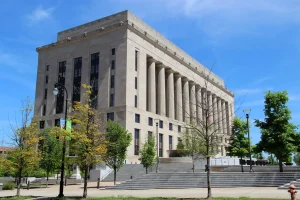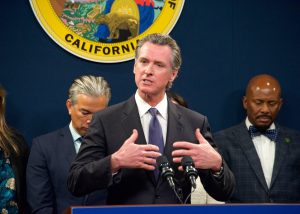In this article, mediator and arbitrator Paul Sills predicts what is in store for governments and businesses in the wake of widespread climate change and the role that mediation has to play in addressing it.
To frame this discussion, I would like to ask about climate change and its impact in the legal sphere. What sorts of conflicts do you expect will become more commonplace as the effects of climate change grow more severe?
As the effects of climate change become more pronounced, the world will witness a rise in a wide array of legal disputes. Many of these disputes will revolve around issues that, until recently, might have been considered peripheral, but are quickly becoming central to the lives of millions and even the stability of nations.
- Paris compliance: Much of the climate change litigation the world has seen since 2015 relates to efforts by NGOs and others to identify via the courts what it means to be ‘Paris compliant’. The Paris Agreement contains little guidance on what it means to be compliant with the 1.5°C and 2.0°C aspirations. NGOs and others have sought answers from the courts and will continue to do so.
- Migration and displacement: One of the most immediate consequences of a lack of drinking water, rising sea levels and extreme weather conditions is the displacement of populations. Coastal areas and low-lying islands are especially vulnerable. This migration will lead to legal battles over refugees' rights, border disputes and the obligations of nations to accept and integrate displaced individuals.
- Resource conflicts: As resources like fresh water become scarcer, conflicts over their use and distribution will intensify. Transboundary water disputes could become especially litigious. Countries sharing the same river, for instance, will clash over water rights, potentially leading to international conflicts.
- Infrastructure and property damage: The increasing frequency of extreme weather events like droughts, hurricanes, floods and wildfires means more damage to infrastructure and private property. Underwriters and reinsurers will become increasingly hesitant to cover this damage and will amend their offerings to exclude these events.
- Corporate accountability: As the global community becomes more concerned about environmental degradation, corporations that contribute significantly to carbon emissions and environmental pollution will face increased legal scrutiny. This will encompass not only direct legal action against polluters but also shareholder disputes about a company's approach to environmental concerns.
- Land loss and sovereignty: Rising sea-levels will submerge some territories, leading to disputes over land ownership and national sovereignty. This could affect maritime boundaries, exclusive economic zones and access to marine resources.
- Public health litigation: Climate change has indirect health effects such as the spread of vector-borne diseases. Affected communities or individuals may seek legal redress against entities they perceive as responsible, whether they be local administrations, industries, or even nations.
- Human rights violations: Climate change repercussions are being framed as human rights issues. For instance, if a government fails to adequately protect its citizens from the foreseeable harm of climate change or does not provide adequate support in the aftermath of extreme events, it could be seen as violating human rights. Refer to the recent court decision in Montana.
- Biodiversity and conservation: Climate change threatens many species, leading to potential extinction. Legal battles will ensue over habitat protection, conservation methods and the rights of indigenous communities linked to these ecosystems.
- Trade and agriculture: Changing climatic patterns affect agriculture, leading to crop failures or reduced yields. This could result in trade disputes and challenges related to food security and exports and imports. This is particularly so as we witness the re-emergence of geopolitics after decades of geoeconomics.
- Regulatory and compliance disputes: As nations establish more stringent regulations to combat climate change, industries will likely challenge these in courts, leading to prolonged legal battles over the extent and nature of regulations and the meaning of a just energy transition.
These disputes will not only shape policies and behaviours at national and international levels but will also define the rights, obligations and responsibilities of entities ranging from individuals and local communities to global conglomerates and nations.
You have mentioned elsewhere that you believe conflict is necessary for growth. How significant do you expect the conflicts created by climate change to become?
Climate change may result in global conflict on a scale we have never seen. Its impact on global peace and security is of significant concern to policymakers, strategists and scholars. The potential magnitude of global conflict precipitated by climate change can be understood by examining its multifaceted impact on human societies.
The most immediate consequences of climate change – rising sea levels, extreme weather events, prolonged droughts and water shortages – have direct implications for human livelihoods. For instance, the loss of agricultural land due to desertification or coastal inundation will lead to food shortages. Similarly, diminished freshwater resources will exacerbate already existing tensions in water-scarce regions. These impacts can result in large-scale human displacement, leading to what are termed ‘climate refugees’. The migration of populations can, in turn, lead to ethnic or resource-based clashes in host regions like the EU.
While quantifying the full magnitude of conflicts exacerbated by climate change is complex, many fear its potential scale may surpass historical conflicts including WWII. Consider the religious wars of the 16th and 17th centuries in Europe. These wars, while extensive in their destruction and societal impact, were regionally concentrated and primarily ideologically driven. In contrast, climate-induced conflicts would have both ideological and resource-based drivers and would span across continents, given the global nature of the issue.
Climate change may result in global conflict on a scale we have never seen.
However, it is essential to be realistic but not fatalistic. Unlike the inevitability of certain historic wars rooted in deep-seated animosities, the worst effects of climate change – and thus the conflicts it might engender – can hopefully still be mitigated. The global community's response to climate change in the coming decades will shape the extent to which it becomes a catalyst for global conflict. Diplomacy, sustainable development and international cooperation play crucial roles in minimising potential hostilities. However, as the world grapples with the effects of a changing climate, it must also prepare for its implications for global peace and security.
What role will mediation play as this occurs? Do you believe that ADR will be more widely adopted as a means of addressing these new conflicts?
Climate change demands an immediate and unified global response. Given its multidimensional nature – engaging nations, corporations, indigenous communities, NGOs and others – it is inevitable that disputes and conflicts emerge. Mediation, alongside other ADR techniques such as facilitated negotiation, conciliation and arbitration can play a pivotal role in effectively addressing these disputes.
By fostering global collaboration, promoting dialogue and propelling action, these techniques can reshape our approach to the climate crisis.
- Promoting global collaboration: Climate change is undeniably a global issue that transcends national borders. It is not confined to the territories of individual countries but is a collective predicament that requires mutual agreement and collaboration. Mediation brings disparate parties together under a common goal. Through a neutral mediator, nations and entities (including a broad range of stakeholders) can work towards mutually beneficial solutions, building trust and understanding in the process. In situations where states might be wary of litigation due to potential losses or power dynamics, mediation can offer a collaborative environment, emphasising shared interests over confrontation.
- Cultivating constructive dialogue: Climate change disputes are often mired in deeply held beliefs, historical grievances and intricate policy frameworks. They might involve a developed nation with a significant carbon footprint against a developing one that seeks economic growth but is vulnerable to climate change. Or they might involve indigenous communities and multinational corporations. In such diverse settings, dialogue becomes paramount. ADR processes, especially mediation, emphasise open communication and consensus building, allowing parties to express concerns, understand opposing viewpoints and jointly explore innovative solutions. This dialogue-centric approach is invaluable in breaking impasses and dispelling misunderstandings.
- Swift and proactive action: The urgency of climate change necessitates swift resolutions to disputes. Traditional litigation can be time-consuming and divisive. ADR methods, on the other hand, can be notably faster and more flexible. Early facilitated negotiation, for instance, can prevent conflicts from escalating by addressing them in nascent stages. By focusing on actionable solutions rather than drawn-out legal battles, ADR ensures that precious time is spent on implementing measures rather than just debating them.
- Cost-effective and inclusive: ADR techniques, and in particular mediation and facilitated negotiation, can be more cost-effective than litigation. This means that parties with fewer resources, such as smaller nations or grassroots organisations, can participate on a more equal footing. Their voices – often crucial in climate change discussions – are therefore more likely to be heard.
- Tailored solutions and capacity-building: Mediation allows for solutions that are customised to the specifics of a dispute. Rather than a one-size-fits-all judgment, mediated outcomes can cater to unique cultural, economic and environmental contexts. Furthermore, the very process of mediation can equip parties with skills and frameworks for future negotiations, enhancing their capacity for constructive dialogue in subsequent conflicts.
Mediation and ADR techniques are essential instruments for fostering global cooperation, dialogue and action to address climate change. Mediation, with its inherent values of collaboration and understanding, emerges as an ideal process for the disputes that will arise as we address climate change.
With the above in mind, what can mediators, legal counsel and ADR bodies do to prepare for this paradigm shift? What knowledge and skills will become essential as a consequence?
Mediators, legal counsel, and ADR bodies must be equipped to handle the evolving challenges that accompany this shift. Measures and essential skills required for this new landscape include:
- Specialised training: Mediators and legal professionals need to deepen their understanding of climate science, international environmental law and related geopolitical and socioeconomic issues. Familiarity with international climate agreements, such as the Paris Agreement, and the intricacies of carbon credits, emission reduction and sustainable development are invaluable. ADR bodies should offer training courses, workshops and seminars to help professionals navigate the complex terrain of climate disputes.
- Cultural competency: Climate change disputes often span continents and cultures. Mediators and lawyers should cultivate cultural sensitivity to bridge gaps between parties from diverse backgrounds. Recognising and respecting cultural nuances can foster an atmosphere of trust and understanding, which is vital for successful mediation.
- Emphasis on collaborative solutions: Traditional win-lose legal paradigms are not the best fit for climate-related disputes. Instead, an emphasis on win-win, collaborative solutions will be pivotal. ADR bodies should create frameworks and facilitate dispute resolution process design that prioritises mutual benefits and shared goals.
- Stakeholder engagement: Given the range of parties involved in climate disputes, from governments to NGOs to indigenous communities, mediators and legal counsel need to be adept at multi-stakeholder engagement. They should be prepared to balance and integrate diverse perspectives to craft holistic solutions. Again, process design is key.
- Technology fluency: Professionals need to be technologically adept. Familiarity with online mediation platforms, data analysis tools and virtual communication can enhance the efficiency and reach of ADR processes.
- Proactive outreach: ADR bodies should actively promote the benefits of mediation in climate disputes. By partnering with environmental organizations, academic institutions and media outlets, they can create awareness and position ADR as a preferred method for addressing climate-related conflicts.
- Ethical considerations: The ethical dimensions of climate change, from intergenerational equity to the rights of nature, will play a pivotal role in disputes. Mediators and legal counsel should be equipped to navigate these profound moral questions with clarity and integrity.
- Continuous learning: Given the dynamic nature of climate science and policy, a commitment to lifelong learning is essential. Regular updates, refresher courses and engagement with the latest research will keep professionals at the forefront of the field. ADR bodies have a key role here.
Mediators, legal counsel and ADR bodies must be proactive, adaptable and committed to the shared goal of fostering global collaboration and sustainable solutions.
In what ways might technology be leveraged to address an uptick in climate-related disputes?
With the surge in climate-related disputes, technology presents vast opportunities for enhancing mediation and ADR processes. Here are several avenues in which technology can be harnessed effectively.
- Virtual mediation platforms: As disputes become increasingly global, parties may span different continents. Virtual mediation platforms enable remote access, ensuring that geographical boundaries do not impede resolution processes. While I much prefer the rich environment of in-person mediation, online mediation is an essential tool with a global reach.
- Data analytics and modelling: Climate-related disputes often revolve around complex datasets, like emission levels, deforestation rates or carbon offsets. Advanced data analytics tools can help parties understand trends, make predictions and assess the impact of proposed solutions. Furthermore, geographic information systems can visually represent environmental data, enabling clearer insights into localised issues and potential resolutions.
- Blockchain for environmental agreements: Blockchain technology can provide transparent and tamper-proof records of environmental commitments and actions. Whether it is tracking carbon offset credits or verifying adherence to emission standards, blockchain can enhance trust among disputing parties and ensure verifiable compliance with mediation outcomes.
- AI and conflict analysis: AI can analyse vast amounts of data to identify potential conflict points or areas of agreement. By predicting where disputes might arise or highlighting shared objectives, AI can streamline the mediation process, allowing parties to focus on key contention points.
- E-learning platforms: E-learning platforms can offer training modules on climate science, international environmental treaties and cultural nuances, equipping mediators and parties with the requisite knowledge.
- Social media and stakeholder engagement: Platforms like X (Twitter), Facebook and LinkedIn can be used to gather stakeholder opinions, crowdsource ideas, or disseminate information about ongoing mediation processes. This can be especially important for large-scale disputes that involve community rights or public interests.
- Digital surveys and feedback mechanisms: Post-mediation feedback is invaluable for refining ADR processes. Digital surveys can offer insights into what worked, what did not, and how the process can be improved. This iterative feedback loop ensures ADR methodologies evolve with changing climate dynamics.
- Collaboration tools: Software like Slack or Microsoft Teams can facilitate real-time communication among mediation teams, allowing them to share resources, coordinate strategies and update each other on progress. This can be particularly useful for complex, multi-stakeholder mediations.
Technology offers a range of tools to make mediation and ADR processes more efficient, transparent, and adaptive.
Is there anything else that you would like to say on the subject of climate change and the mediation landscape?
The challenge of climate change underscores the intertwined destinies of nations and communities. As the planet warms, disputes are set to increase, making the role of mediation ever more crucial.
Mediation practices and conflict engagement process design need to develop to address existential problems on a global scale. In this context, consensus building and collaboration emerge as imperatives for survival.
However, the path is not straightforward. Amidst increasing geopolitical pressures and tensions, where national interests often collide, crafting a shared vision becomes challenging. Yet it is this very friction that underscores the need for skilled mediation.
[ymal]
The stakes of climate change are unparalleled, demanding that nations rise above transient politics and engage in genuine dialogue. Mediators equipped with the right tools and mindset can help navigate these treacherous waters, facilitating conversations that prioritise our shared human legacy.
In an era of increasing divisions, the challenge of climate change offers a chance to reaffirm our shared commitment to the planet and to each other. Mediation, by fostering consensus and collaboration, becomes a beacon of hope in this global endeavour.
Paul Sills, Arbitrator & Mediator
100 St Paul’s Churchyard, London, EC4M 8BU, UK
Tel: +44 02079 367070
E: paul.sills@paullsills.co.nz
Paul Sills is a leading independent international arbitrator and mediator with over 27 years of litigation experience, often involving multi-parties and complex commercial issues. His arbitration and mediation practices reflect this experience, as he is frequently called on to either determine or help resolve complex multi-party disputes. Paul also teaches International Commercial Arbitration in the LLM programme at the University of Westminster and was named by WWL as a Global Leader in mediation in 2022 and 2023.
Arbitra International is a global organisation that assists lawyers, GCs and party-appointed tribunal in finding the right arbitrator or mediator. A member organisation for leading independent arbitrators, mediators, adjudicators and dispute board members, Arbitra provides next-generation arbitrator support services geared towards complex and challenging disputes.





















